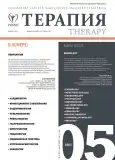Cognitive disorders in patients with hypertonic cerebral microangiopathy associated with type 2 diabetes mellitus and COVID-19
- Authors: Semenova T.N.1, Grigorieva V.N.1, Zanozina O.V.1,2, Sukhanov S.A.1
-
Affiliations:
- Privolzhsky Research Medical University of the Ministry of Healthcare of Russia
- N.A. Semashko Nizhny Novgorod Regional Clinical Hospital
- Issue: Vol 9, No 5 (2023)
- Pages: 38-44
- Section: ORIGINAL STUDIES
- Published: 15.05.2023
- URL: https://journals.eco-vector.com/2412-4036/article/view/569030
- DOI: https://doi.org/10.18565/therapy.2023.5.38–44
- ID: 569030
Cite item
Abstract
Hypertonic cerebral microangiopathy (hCMA), type 2 diabetes mellitus (DM) and COVID-19 are independent factors in cognitive deficits development, but there there are no data concerning potentiation of their negative impact at cognitive functions.
The aim: to reveal the impact of type 2 DM and survived COVID-19 at the severity and peculiarities of cognitive disorders in patients with hCMA.
Materials and methods. We examined 33 patients with hCMA, 30 with hCMA and type 2 DM, and 33 with hCMA and type 2 DM who had undergone COVID-19 in the previous year. Clinical and neurological examination, neuroimaging, estimation of cognitive disorders using Frontal dysfunction Battery (FAB) and Montreal cognitive assessment scale (MoCA) were performed.
Results. Patients with a combination of type 2 DM and hCMA differed from patients with isolated hCMA in a greater severity of regulatory dysfunction according to FAB data. Taken place during the previous year, COVID-19 exacerbated cognitive impairment in patients with hCMA in combination with type 2 DM, as evidenced by the analysis of the results of MoCA. 82% of patients with hCMA and type 2 DM who underwent COVID-19 had moderate or severe cognitive disorders according to MoCA data. The increase in cognitive deficit in this category of patients occurred mainly due to the deterioration of visuospatial and mnestic functions.
Conclusion. Type 2 diabetes melitus leads to an increase in regulatory dysfunction in patients with hCMA. COVID-19 contributes to the aggravation of cognitive decline in patients with a combination of hCMA and type 2 DM, negatively affecting primarily the visuospatial and mnestic spheres of cognitive activity.
Full Text
About the authors
Tatyana N. Semenova
Privolzhsky Research Medical University of the Ministry of Healthcare of Russia
Author for correspondence.
Email: neurotmdoc@gmail.com
ORCID iD: 0000-0001-5689-2544
PhD in Medical Sciences, Assistant at the Department of Nervous Diseases
Russian Federation, Nizhny NovgorodVera N. Grigorieva
Privolzhsky Research Medical University of the Ministry of Healthcare of Russia
Email: vrgr@yandex.ru
ORCID iD: 0000-0002-6256-3429
MD, Professor, Head of the Department of Nervous Diseases
Russian Federation, Nizhny NovgorodOlga V. Zanozina
Privolzhsky Research Medical University of the Ministry of Healthcare of Russia; N.A. Semashko Nizhny Novgorod Regional Clinical Hospital
Email: zwx2@mail.ru
ORCID iD: 0000-0003-1830-3600
MD, Associate Professor, Professor of the Department of Hospital Therapy and General Medical Practice named after V.G. Vogralik, Privolzhsky Research Medical University of the Ministry of Healthcare of Russia
Russian Federation, Nizhny Novgorod; Nizhny NovgorodSergey A. Sukhanov
Privolzhsky Research Medical University of the Ministry of Healthcare of Russia
Email: sukhanov.aleck@yandex.ru
Postgraduate Student of the Department of Hospital Therapy and General Medical Practice named after V.G. Vogralik
Russian Federation, Nizhny NovgorodReferences
- Боголепова А.Н. Когнитивные и эмоциональные нарушения у больных с хронической цереброваскулярной недостаточностью. Медицинский совет. 2020; (8): 29–37. [Bogolepova A.N. Cognitive and emotional impairment in patients with chronic cerebrovascular insufficiency. Meditsinskiy sovet = Medical Council. 2020; (8): 29–37 (In Russ.)]. https://dx.doi.org/10.21518/2079-701X-2020-8-29-37. EDN: MKIEEK.
- Cheng G., Huang C., Deng H., Wang H. Diabetes as a risk factor for dementia and mild cognitive impairment: A meta-analysis of longitudinal studies. Int J Geriatr Psychiatry. 2013; 28(5): 441–49. https://dx.doi.org/10.2147/CIA.S48926.
- Damanik J., Yunir E. Type 2 diabetes mellitus and cognitive impairment. Acta Med Indones. 2021; 53(2): 213–20.
- Lima-Martínez M.M., Boada C.C., Madera-Silva M.D. et al. COVID-19 and diabetes: A bidirectional relationship. Clin Investig Arterioscler. 2021; 33(3): 151–57. https://dx.doi.org/10.1016/j.arteri.2020.10.001.
- Hugon J., Msika E.-F., Queneau M. et al. Long COVID: Cognitive complaints (brain fog) and dysfunction of the cingulate cortex. J Neurol. 2022; 269(1): 44–46. https://dx.doi.org/10.1007/s00415-021-10655-x.
- Tavares-Junior J.W.L., de Souza A.C.C., Borges J.W.P. et al. COVID-19 associated cognitive impairment: A systematic review. Cortex. 2022; 152: 77–97. https://dx.doi.org/10.1016/j.cortex.2022.04.006.
- Бирюкова Е.В., Шинкин М.В. Диабетические микроангиопатии: механизмы развития, подходы к терапии. РМЖ. Клиническая офтальмология. 2018; 18(2): 91–96. [Biryukova E.V., Shinkin M.V. Diabetic microangiopathies: mechanisms of development, approaches to the therapy. Russkiy meditsinskiy zhurnal. Klinicheskaya oftal’mologiya = Russian Medical Journal. Clinical Ophthalmology. 2018; 18(2): 91–96 (In Russ.)]. EDN: UQXDNO.
- Umegaki H. Type 2 diabetes as a risk factor for cognitive impairment: current insights. Clin Interv Aging. 2014; 9: 1011–19. https://dx.doi.org/10.2147/CIA.S48926.
- Sun L., Diao X., Gang X. et al. Risk Factors for cognitive impairment in patients with type 2 diabetes. J Diabetes Res. 2020; 2020: 4591938. https://dx.doi.org/10.1155/2020/4591938.
- Moheet A., Mangia S., Seaquist E.R. Impact of diabetes on cognitive function and brain structure. Ann N Y Acad Sci. 2015; 1353: 60–71. https://dx.doi.org/10.1111/nyas.12807.
- Belikina D.V., Malysheva E.S., Petrov A.V. et al. COVID-19 in patients with diabetes: clinical course, metabolic status, inflammation, and coagulation disorder. Sovrem Tekhnologii Med. 2020; 12(5): 6–18. https://dx.doi.org/10.17691/stm2020.12.5.01.
- Kohut A.O., Chaban O.S., Burdeinyi A.O. et al. Post-COVID cognitive impairment in patients with type 2 diabetes mellitus. Wiad Lek. 2022; 75(8 pt 1): 1895–99. https://dx.doi.org/10.36740/WLek202208113.
- Mendez R., Balanza-Martinez V., Luperdi S.C. et al. Long-term neuropsychiatric outcomes in COVID-19 survivors: A 1-year longitudinal study. J Intern Med. 2022; 291(2): 247–51. https://dx.doi.org/10.1111/joim.13262.
- Miskowiak K.W., Johnsen S., Sattler S.M. et al. Cognitive impairments four months after COVID-19 hospital discharge: Pattern, severity and association with illness variables. Eur Neuropsychopharmacol. 2021; 46: 39–48. https://dx.doi.org/10.1016/j.euroneuro.2021.03.019.
- Miskowiak K.W., Fugledalen L., Jespersen A.E. et al. Trajectory of cognitive impairments over 1 year after COVID-19 hospitalisation: Pattern, severity, and functional implications. Eur Neuropsychopharmacol.2022; 59: 82–92. https://dx.doi.org/10.1016/j.euroneuro.2022.04.004.
- Premraj L., Kannapadi N. V., Briggs J. Mid and long-term neurological and neuropsychiatric manifestations of post-COVID-19 syndrome: A meta-analysis. J Neurol Sci. 2022; 434: 120162. https://dx.doi.org/10.1016/j.jns.2022.120162.
- Wang H., Lu J., Zhao X. et al. Alzheimer’s disease in elderly COVID-19 patients: potential mechanisms and preventive measures. Neurol Sci. 2021; 42(12): 4913–20. https://dx.doi.org/10.1007/s10072-021-05616-1.
Supplementary files











